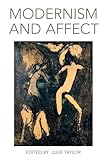Modernism and Affect / Julie Taylor.
Material type: TextPublisher: Edinburgh : Edinburgh University Press, [2022]Copyright date: ©2015Description: 1 online resource (240 p.) : 11 B/W illustrationsContent type:
TextPublisher: Edinburgh : Edinburgh University Press, [2022]Copyright date: ©2015Description: 1 online resource (240 p.) : 11 B/W illustrationsContent type: - 9780748693252
- 9780748693269
- 700.4/112
- NX456.5.M64 M595 2015
- NX456.5.M64
- online - DeGruyter
- Issued also in print.
| Item type | Current library | Call number | URL | Status | Notes | Barcode | |
|---|---|---|---|---|---|---|---|
 eBook
eBook
|
Biblioteca "Angelicum" Pont. Univ. S.Tommaso d'Aquino Nuvola online | online - DeGruyter (Browse shelf(Opens below)) | Online access | Not for loan (Accesso limitato) | Accesso per gli utenti autorizzati / Access for authorized users | (dgr)9780748693269 |
Frontmatter -- Contents -- List of Illustrations -- Acknowledgements -- Notes on Contributors -- Introduction: Modernism and Affect -- Chapter 1 Mind, Body and Embarrassment in Henry James's The Awkward Age -- Chapter 2 The Trauma of Form: Death Drive as Affect in À la -- Chapter 3 Affective Ethical Valuing in Hulme and Scheler Logic of the Heart: Affective Ethical Valuing in T. E. Hulme and Max Scheler -- Chapter 4 The Line that Binds: Climbing Narratives, Ropework and Epistolary Practice -- Chapter 5 The Amplification of Affect: Tension, Intensity and Form in Modern Dance -- Chapter 6 Love and the Art Object -- Chapter 7 Animating Cane: Race, Affect, History and Jean Toomer -- Chapter 8 Fear and Precarious Life after Political Representation in Baudelaire -- Chapter 9 Bloom-Space of Theory: The Pleasure and the Bliss of Gerty MacDowell -- Chapter 10 From Odysseus to Rotpeter: Adorno and Kafka, Mimicry and Happiness -- Chapter 11 Making Happy, Happy-making: The Eameses and Communication by Design -- Index
restricted access online access with authorization star
http://purl.org/coar/access_right/c_16ec
This collection reconsiders Modernism in the light of the humanities' affective turn"This book addresses an under-researched area of modernist studies, reconsidering modernist attitudes towards feeling in the light of the humanities' turn to affect. The eleven original chapters and chapter-length introduction consider the affective dimensions of a range of forms and media - including literature, architecture, philosophy, dance, visual art, and design - tracing modernism from its origins in the nineteenth-century to its afterlives in the postwar period. Modernism and Affect engages with contemporary theories of affect but also turns to a surprisingly wide range of theoretical models - including psychoanalysis, phenomenology, critical theory and poststructuralism - as it emphasises the complexities of modernist affect and emotion.Key FeaturesPresents 11 original essays by international scholars exploring the relationships between modernism and affectOffers a multi- and interdisciplinary approach to modernist studiesChallenges the assumption that modernism is marked by a lack of interest in the emotionsOutlines influential theories of affect for scholars and students of modernist studies"
Issued also in print.
Mode of access: Internet via World Wide Web.
In English.
Description based on online resource; title from PDF title page (publisher's Web site, viewed 02. Mrz 2022)


